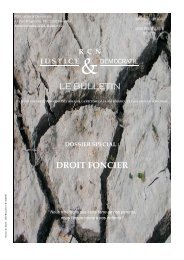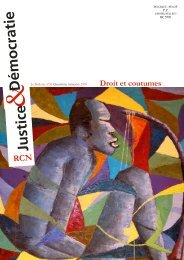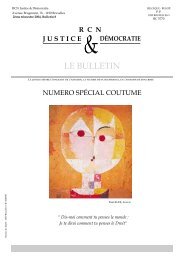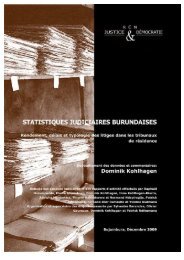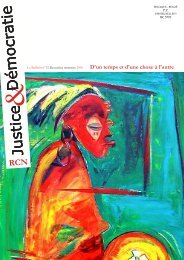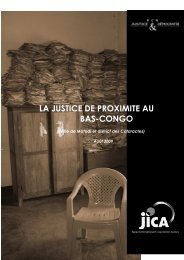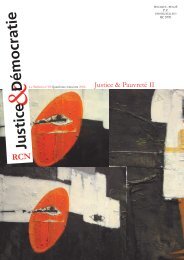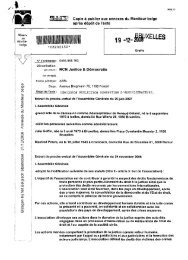Démocratie
ém o cratie Ju stice - RCN Justice & Démocratie
ém o cratie Ju stice - RCN Justice & Démocratie
Create successful ePaper yourself
Turn your PDF publications into a flip-book with our unique Google optimized e-Paper software.
South Sudan<br />
The geopolitical situation<br />
AREA: 644 329 km2 1<br />
POPULATION: 8 260 000 inhabitants 2<br />
GNI PER CAPITA, USD: 984 3<br />
GDP in 2010: 13 billion USD 4<br />
HDI: 0,408 (169/187) for Sudan, South<br />
Sudan numbers are not available yet 5<br />
ECONOMY: Oil provides for 98% of the<br />
government budget but while 75% of all<br />
the former Sudan's oil reserves are in<br />
South Sudan, the refineries and pipelines<br />
to the Red Sea are in still in Sudan and<br />
the 2005 agreement providing that South<br />
Sudan received 50% of Sudan's oil proceeds<br />
expired with the independence.<br />
Moreover South Sudan is one of the least<br />
developed countries in the world even<br />
though some economic improvement<br />
was noticed since 2005, especially concerning<br />
infrastructures. But there is an<br />
urgent need to develop the agriculture,<br />
especially considering that over 2 million<br />
refugees arrived from the North since<br />
2005 and need to both be fed and employed.<br />
POLITICS:<br />
Republic of South Sudan<br />
Independence: 9 July 2010<br />
Head of State: Salva KIIR<br />
The comprehensive peace agreement of<br />
2005 and the following independence of<br />
South Soudan put a stop to a 21-year civil<br />
war which caused two millions deaths.<br />
JUSTICE: 4 types of court : ordinary, military,<br />
special and tribal. The judicial system<br />
in the South is less developed than in<br />
the North. The main problem is the lack<br />
of legal education of the magistrates<br />
who often have military backgrounds.<br />
1234 National Bureau of Statistics of the Republic<br />
of South Sudan, 2010<br />
5<br />
UNDP, HDR 2011<br />
The 9 th of July marked the formal scission<br />
of one of the largest African countries<br />
in two. It concluded a long process<br />
including the Comprehensive Peace<br />
Agreement (CPA) of 2005, the presidential<br />
and parliamentary elections of April<br />
2010 (which re-elected Salva KIIR as president<br />
of the South with 93% of the<br />
votes) and the referendum on selfdetermination<br />
of South Sudan on the 9 th<br />
of January 2011 (with 98% of Southerners<br />
favourable to independence). On the<br />
14th of July South Sudan became the<br />
193rd member of the United Nations.<br />
However since the months before the<br />
declaration of independence, violence<br />
between the Southern army, the Northern<br />
army and several rebel groups led to<br />
almost 1,000 dead and 100,000 displaced,<br />
according to officials 1<br />
Indeed the Southern Sudan army, the<br />
Sudan People’s Liberation Army (SPLA),<br />
is still fighting with about seven separate<br />
militia groups, among which is the<br />
rebellion led by Peter GATDET. The renegade<br />
general fought for the North during<br />
Sudan’s 1983-2005 civil war before<br />
joining the Southern army, and then<br />
returning to rebellion on the 28th of<br />
March 2011. Another major rebel is the<br />
general ATHOR who turned violent after<br />
losing the Jonglei state’s gubernatorial<br />
race to the incumbent governor. If rebels’<br />
official motivation is struggling for<br />
“democratic transformation”, critics<br />
argue that they have little ambition<br />
beyond seizing power from the government<br />
in order to gain influence ahead<br />
of independence. Moreover Juba accuses<br />
the North of supporting those<br />
rebellions which Khartoum always denied.<br />
An actual open zone of conflict between<br />
the North and the South is the<br />
disputed region of Abyei, located in the<br />
border area, which is still raising grave<br />
concerns among the international society.<br />
This territory is economically and<br />
politically important for both parties<br />
due to its oil resources and its ethnic<br />
composition of pro-South farmers Dinka<br />
Ngok, and Northern cattle-herding nomads<br />
Misseriya. This area didn’t get to<br />
vote for its independence in a regular<br />
way because the voting privileges of the<br />
nomads were disputed, which led to the<br />
present undecided and conflicted situation.<br />
Moreover the OHCHR issued a report in<br />
august 2011 denouncing possible war<br />
crimes and crimes against humanity in<br />
Sudan’s Southern Kordofan state. Indeed<br />
heavy fighting started there in the<br />
months prior to the independence of<br />
South Sudan including aerial bombardments<br />
in Southern Kordofan and the<br />
Nuba Mountains as well as killings of<br />
civilians and house-to-house searches in<br />
the capital city area. There were even<br />
some accusations by religious leaders of<br />
“ethnic cleansing”. The importance of<br />
Southern Kordofan comes from the fact<br />
that it was a key battleground during<br />
Sudan’s 1983-2005 civil war. At that time<br />
many in the Nuba Mountains sided with<br />
Southern forces. Now they find themselves<br />
on the wrong side of the border<br />
but still refuse to surrender their weapons.<br />
They find themselves isolated as the<br />
North won’t tolerate the presence of<br />
this army within its borders while the<br />
South refuses to take responsibility for<br />
its former allies.<br />
Temporary agreements have been<br />
made on Abyei and on Southern Kordofan<br />
as well as on the creation of a 20kmwide<br />
demilitarized border buffer zone,<br />
however these must still be implemented.<br />
Indeed even though governments<br />
of North and South Sudan agreed<br />
on the 20 th of June to demilitarize the<br />
Abyei region and entrust it to an Ethiopian<br />
peacekeeping force, the Northern<br />
army has refused to withdraw its forces<br />
up till now and the situation remains<br />
unstable. Moreover humanitarian agencies<br />
are still unable to freely access the<br />
civilian population, partly because of the<br />
frequent use of landmines.<br />
Regarding the institutional situation,<br />
South Sudan’s institutions are being set<br />
up but there is a lack of effective officials<br />
most of the existing ones being<br />
truly unskilled. Moreover according to<br />
Ronald WASILWA from the Africa Peace<br />
Forum, only “the highest levels of the<br />
executive branch [are] set up” and “the<br />
structures that have been put up in<br />
South Sudan are good, but they need to<br />
go down to the people”. The government<br />
is also accused of corruption and<br />
there seems to be a clear lack of pluralism,<br />
with an obvious dominance by the<br />
ruling Sudan People’s Liberation Movement<br />
(SPLM). Finally the now official<br />
Sudan People’s Liberation Army (SPLA)<br />
has been accused (during the time<br />
where it was still a rebel force inside of<br />
one Sudan) of rape, massacres, extrajudicial<br />
killings and abuses, which leads<br />
to fears that it might not change its<br />
ways.<br />
E.F.F.<br />
23




